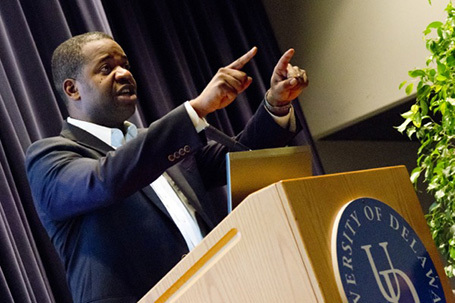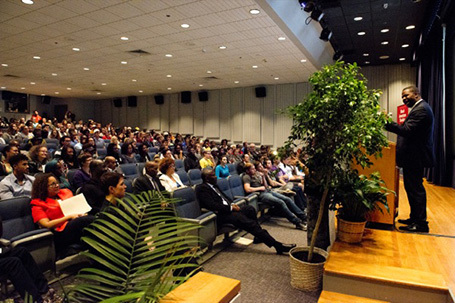Peterson lecture : A powerful movement
Lehigh’s Peterson offers his insights on Black Lives Matter

Black Lives Matter activists, inspired by recent deaths that occurred at the hands of police, have created a “powerful and emerging? movement that reflects numerous inequities in society and is beginning to bridge the traditional divide between feminists and anti-racists.
That was just part of the multifaceted message that scholar and public commentator James Braxton Peterson brought to an audience that filled Trabant Theatre at the University of Delaware on Thursday, Oct. 8.
Titled “A Song, a Slogan and a Service: Dispatches from the Black Lives Matter Movement,” Peterson’s talk covered elements of the movement from music to a woman-centered “movement within a movement? to a recent Sunday service he attended at the South Carolina church where nine people were killed in a mass shooting in June.
The wide-ranging subject matter was in keeping with Peterson’s varied work as a literary scholar, an associate professor and director of Africana Studies at Lehigh University and the founder of Hip Hop Scholars LLC, an association of hip hop generation scholars dedicated to researching and developing the cultural and educational potential of hip hop, urban and youth cultures.
In introducing his talk, Erica Armstrong Dunbar, associate professor of Black American studies and of history at UD, said Peterson is “not only an expert on youth culture but an integral part of it? and that he “has an incredible breadth of knowledge at the intersection of politics and race.”
Peterson opened his talk by discussing the song that he said has become an anthem of Black Lives Matter, “Alright,” written and recorded by Kendrick Lamar. The movement has and will continue to have other anthems as well, he said, but “Alright? features many elements that easily elevated it to anthem status.
Those include Lamar’s complex lyrics, such as references to Nazareth that Peterson said recall the Christian ethos while also incorporating multiple meanings of the word and the way the lyrics move back and forth between sacred and profane. The music video also provides an important visual context, he said, in a movement where the availability of video has been key.
“Police brutality against poor people and people of color isn’t new,” Peterson told the audience. “What’s new is our ability to capture it? on cellphone cameras and share those videos via social media.
He also singled out the first line of “Alright?: “Alls my life I has to fight,” taken directly from Alice Walker’s Pulitzer Prize-winning novel The Color Purple. “You have to admire Kendrick Lamar for tapping into this black literary history and its female perspective,” Peterson said.
In fact, he said, the movement is often led by black women.

A section of the talk, titled “A Slogan Proliferates,” discussed the use of various hash tags by Black Lives Matter activists. Many use the names of people killed by police, and one, ?#Say Her Name,” focusing on women who have died, was created and is led by black women. That slogan has become a movement within the larger movement, Peterson said.
“Feminism and anti-racism movements have often asked black women to choose one or the other,” he said during a question-and-answer session that followed the talk. “But they intersect every day for black women, and that’s important.”
Black Lives Matter – “Wherever I go, the leaders are black women?? is making progress in bringing the two movements together, Peterson said. He added that those interested in the movement should also consider other areas that intersect in people’s lives and in society, including race, class and poverty.
In the final topic of the speech, Peterson described a visit he and his family made to Emanuel AME Church in Charleston, South Carolina, several weeks after the shootings killed eight church members and their senior pastor at a prayer meeting. The gunman, with numerous ties to white supremacy views, has been indicted on murder and federal hate crime charges.
“Even with the blood still in the rug, it is a beautiful, beautiful church,” he said of the historic church often known as “Mother Emanuel.”
He described the outpouring of letters, gifts and visitors to the congregation after the shootings, and said many visitors spoke briefly at the Sunday service to express their condolences. However, Peterson said he was struck by how many individual speakers seemed to focus on their own reactions to the tragedy rather than on those in the church and community who must live with the results of the violence every day.
“It made me realize that it’s not about an individual response; it’s about what we can do for the community affected by it,” he said. “This movement is about community.”
More about James Braxton Peterson and his lecture
Peterson has written numerous scholarly articles on hip hop culture and linguistics, as well as urban studies. His first book, The Hip Hop Underground and African American Culture, was published in September 2014.
He also is a regular contributor to publications including Huffington Post, TheGrio.com, BET.comand The Daily Beast and has appeared on MSNBC, Al-Jazeera, CNN, HLN, Fox Newsand other networks as an expert on race, politics and popular culture. Peterson hosts “The Remix,” a podcast that engages issues at the intersection of race, politics and popular culture, on Philadelphia’s NPR affiliate, WHYY.
His talk was hosted by the Department of Black American Studies and sponsored by the College of Arts and Sciences, the vice provost for diversity, University Museums, the Center for Black Culture, the Center for Political Communication, the Center for the Study of Diversity and the departments of English, History, Political Science and International Relations, and Public Policy and Administration.
